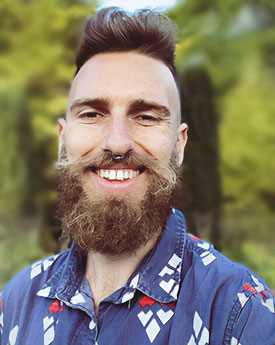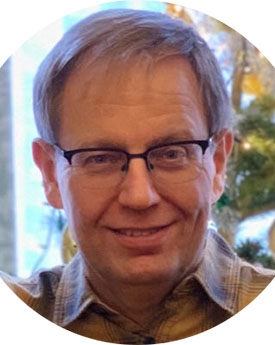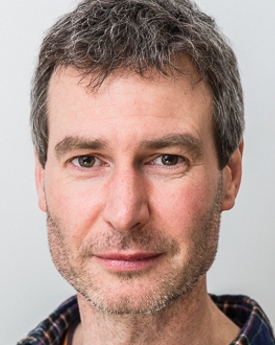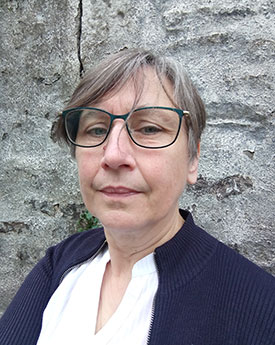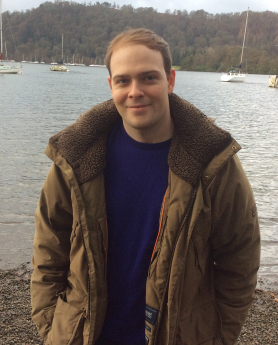Staff Research Interests
Loading People
We couldn't find anybody who matched your criteria
My research explores dialogues between French Studies and the Medical Humanities. In particular, I look at how contemporary French philosophy and cultural production approach innovations in biomedical science, and how biomedical science also inspires innovations within philosophy and cultural production. I have published on the philosophy of Catherine Malabou, whose interdisciplinary between philosophy and (neuro)science explores how living beings are "plastic" and transform throughout life. My new research looks at representations of the hospital in contemporary French philosophy.
My research interests encompass contemporary German-speaking culture in a number of forms - literary, filmic, and more broadly socio-political. I'm very interested in the Nobel-prize-winning, Austrian author Elfriede Jelinek and have published many articles and chapters on her work as well as one of the first monographs on her oeuvre. My recent work has focused on issues concerning literary and cultural protest and resistance against the extreme right in present-day Austria.
Cornelia's research focuses on poetry in performance, committed writing, and cultural imaginaries of acquiescence and stories of critical hope.
She explores the interplay of emancipation and experimentality in performance poetry, engages with committed writing as a practice that takes us beyond identification or 'othering', picks apart cultural imaginaries of acquiescence and counters these with narratives of critical hope. Her research includes Europe and the Spanish-speaking Americas, and literatures in Spanish, English, and German.
Cornelia's research draws on the methodologies of literary and cultural analysis. She has been involved in several international research projects on contemporary poetry.
My research focuses on modern and contemporary French literature, creative-critical writing and transcultural artistic practices. I am a member of the Critical Poetics research group (Nottingham Trent University), the AHRC-funded Experiential Translation Network and the Eco-translation Network (Edinburgh University). In my work I am particularly interested in creative-critical and intermedial practices around translation, the relationship between translation and the arts, and in translation as a space for thinking transformatively about international relations in multispecies environmental contexts. My work in this area explores the socially transformative potential of intermedial and creative-critical translation practices as world-making and inter-epistemic practices, establishes new generative links between practice and research, and models new epistemologies and forms of experimental scholarship. My interest in epistemological diversity and ecosemiotics is tied to my work on minority languages such as Alsatian as well as my interest in multispecies animacies across languages and cultures.
My most recent past research project in this area, 'Translation as Creative Critical Practice' (AHRC/MEITS), researched the ways in which translation can stimulate creative approaches to scholarship and to the reading and interpretation of texts across media. I have recently written a book entitled Translation as Creative-Critical Practice (Cambridge University Press, 2023) which explores the separation between practice and theory in translation studies through my analysis of creative-critical translation experiments. Focusing on contemporary literary and artistic engagements with translation such as the autotheoretical translation memoir, performative translations and 'transtopian' literary and visual art works, my book argues for a renewed engagement with translation studies from the point of view of translation as artistic and practice-based research capable of reframing social and geographical relations. Exploring examples of translation as both a norm-breaking activity in the works of Kate Briggs, Ayesha Manazir Siddiqi, Noémie Grunenwald, Anne Carson, Charles Bernstein, Chantal Wright or Slavs and Tatars to name a few, this book prompts readers to reconsider translation as a world-making activity in its own right.
Some reviews:
'The present volume is likely to be influential: Grass’s terms and definitions are useful, incisive, and intuitive (a combination rarely achieved in cutting-edge scholarship!), and her readings of fascinating work by translators from Anne Carson to Sophie Lewis to Chantal Wright are models of analytical practice in their own right.’ Christopher Friker in French Studies.
‘This is a vital critique of translation theory, and the opening of a new chapter in translation studies: a debate around “weak” or “tender” theory of translation. What an exciting moment for the discipline.’ Kasia Szymanska in Babel.
‘Grass challenges the traditional postulates of the field of translation studies, aiming to inspire renewed activity in translation as a field of political and theoretical engagement through practice. One of the most inspiring ideas that she offers is that it is possible to view translation failure as a site of cultural production and resistance.’ Marijana Javornik Čubrić in The Linguist.
I am also collaborating with Dr. Lily Robert-Foley (University of Montpellier III) on two further projects in this area of research. One is a monograph collective monograph entitled Unending Translation: Creative-Critical Experiments in Translation and Life Writing (UCL Press, forthcoming). The other is a special of issue of Life Writing (Routledge) entitled ‘The Translation Memoir’, published in 2024.
Another aspect of my research into contemporary creative practices focuses on the relationship between literature, art and political philosophy. I have written and published works on Michel Houellebecq, French politics, writing technologies and posthumanism. In the field of French and francophone art practices, I have also published work on the cultural and artistic history of the Alsace and Lorraine borderland and the relationship between Modernism and national indifference more generally. I am also a published poet, creative-critical writer and poetry translator.
Chris has primary research interests in Mexican cultural politics, literary masculinities, gender theory, critical theory and ethical criticism. He has published on Mexican authors such as Azuela, Rulfo, Castellanos, Mastretta, González de Alba and Poniatowska, on the cultural politics of the Mexican Revolution and the 1968 Tlatelolco Massacre, and has used interpretative frameworks that range from R.W. Connell's sociological theorisation of masculinities to Raymond Williams' structures of feeling, Edward Said's contrapuntal reading and Heidegger's comenatries on the fore-structures of understanding in Being and Time.
My research principally concerns gender and class in Chinese/Sinophone populations, with a particular focus on middle-class masculinities. I have also published on happiness in China. My most recent China-focused project looks at Chinese male beauty vlogging and makeup for men. More widely, I have also developed a research interest in critical pedagogy in modern languages and the future of languages and cultures as a sector, particularly involving its interdisciplinary interactions with STEM disciplines. I often approach topics from a wide-ranging cultural studies perspective, covering discourse and practice. Ethnographic, narrative and critical discourse methodologies frequently inform my data gathering and analysis.
I am currently working on creative writing approaches to language teaching. I am also interested in cultural responses to the posthuman and reflections on the microscopic (dust). I have past publications on GDR (East German) literature and on women and war in film.
Véronique carries out research in the pragmatics of translation, cognitive studies, and medical humanities.
Recent publications include two journal special issues she has edited for L'Esprit Créateur (Johns Hopkins, 2018) and Translation and Literature (Edinburgh UP, 2020).
She has also edited the first book on "literary back-translation", in collaboration with scholars from the US to the UK, France, Italy, Turkey, and China. Her own contributions in the book include a substantial introduction theorizing literary back-translation and delineating its ethical and philosophical implications, as well as a double chapter, "Theorizing Back-Translation: From Antoine Berman on Retranslation to the Three Layers of The Monk" (Edinburgh UP; in press).
Her second monograph, Literary Translation and Mental health, offers a comparative analysis of the translation processes of seven modernist writers-translators with lived experience of mental ill health - Friedrich Hölderlin, Gérard de Nerval, Virginia Woolf, Marcel Proust, T.S. Eliot, H.D. and Antonin Artaud - and theorizes translation as a powerful form of introspection impacting identity formation and cognition.
Her current research project investigates the therapeutic value of the translation process for NHS patients on the autism-schizophrenia spectrum.
My research interest revolves around the intersection of culture, identity, and second language learning, specifically focusing on the context of learning Chinese as a second language. This could include several areas, such as the cultural impact on language learning, identity negotiation, motivation and investment, the experiences of heritage language learners, and effective teaching strategies.
I am cultural historian and scholar of contemporary peninsular Spanish literature, with particular interests in the Franco dictatorship and the Holocaust. My research spans the fields of comparative literature, collective memory, analytic philosophy, and the medical humanities. My current work is focused on two areas of Spanish memory studies: first, the emergence of collective memories of the Holocaust and their role in shaping dissident artistic practices during the Franco dictatorship; second, the genealogy of perpetrator narratives of the Spanish Civil War.
I am interested in the study of media and comparing the wording and the analysis of events according to various sources of media, particularly regarding sporting events.
I have given many public talks about sports and sports events or personalities in France, or in the Francophone world.
Emily Spiers is Senior Lecturer in Creative Futures and German. Their work focuses on narrative as a tool for Futures Literacy, as well as future-oriented, innovative trends in communicative, socio-digital and literary practices. They explore how futures are being envisaged, anticipated and made through art and literature -- and how creative narratives can help articulate multiple futures in fields as diverse as defence, education and climate-change research.
Their research into authorship focuses on spoken-word poetry as an aesthetic, socio-digital and political practice, and as a world literary phenomenon. Underpinning their work is the question of how, through the presence of the author-performer, performance poetry foregrounds the question of agency in relation to literature: the active shaping of a world in time that literature carries out.
Find out about FLiNT
Visit my page on Academia.edu.
I research Spanish and Latin American film and literature. My principal current interest is 'cine de choque', a term I have developed for the analysis of films by Spanish-speaking film directors in which car crashes feature. I have written two articles and I’m now preparing a monograph on this subject. I have co-edited a special issue and published articles on the relationship between masculinities and violence in Latin American film and literature. I have published two articles, a book chapter and a book on the fiction of the Mexican author Juan Rulfo.
I am interested in cultural ways of knowing space, time and the environment, across languages. My current research covers two main areas.
First, I am interested in questions of time and the environment. This emerged from my work on 'Anthropocene Lateness' in the poetry of Austrian poet Friederike Mayröcker. In 2019, I cofounded the British Academy-funded Anthropocene Times research network with Dr Blake Ewing (University of Nottingham), and ran a small research project on how we use creativity to navigate time in the Anthropocene. In 2023-26, Dr Ewing and I are leading a British Academy Knowledge Frontiers International Interdisciplinary research project on 'Wetland Times', comparing time language and concepts across three global wetland landscapes.
My previous research focused on English and German-language poets of the twentieth and twenty-first centuries, including Paul Celan, J. H. Prynne, Ulrike Almut Sandig, Edwin Morgan and Friederike Mayröcker. My first monograph, Space, Place and Poetry in English and German, 1960-1975 (Palgrave, 2018), looked at engagements with place and landscape in the work of a range of writers working in the twentieth-century, at a moment of rapid transformation in thinking about space and spatiality. I argued that writers in these two quite different traditions were working through similar issues of disrupted spatiality and, in so doing, were also radically reimagining the European lyric in ways that only a comparative reading could bring properly into focus.
Together with Jana Maria Weiss and Alexander Kappe, I am a co-editor of the landmark anthology The Opposite of Seduction: New Poetry in German (Shearsman, 2025) - the first major anthology of contemporary German-language poetry in English for more than 40 years, bringing together more than hundred poems by more than sixty poets and translators. This project was awarded an English PEN prize and is supported by the German Translators' Fund.
Dr Amily Guenier’s research interest is in communication, including intercultural communication, business communication, health communication and interpersonal communication in the healthcare and higher education context.
Her PhD thesis is on enhancing Chinese philosophy and health practice in the 21 century. Amily has been the student supervisor of Study China programme for 7 years. The Study China Programme is funded by the Government department for Business, Innovation and Skills. From July 2011 to September 2017, Amily Guenier was supervisor of the UK Study China Programme, which was funded by the British government with £2.2 million.


